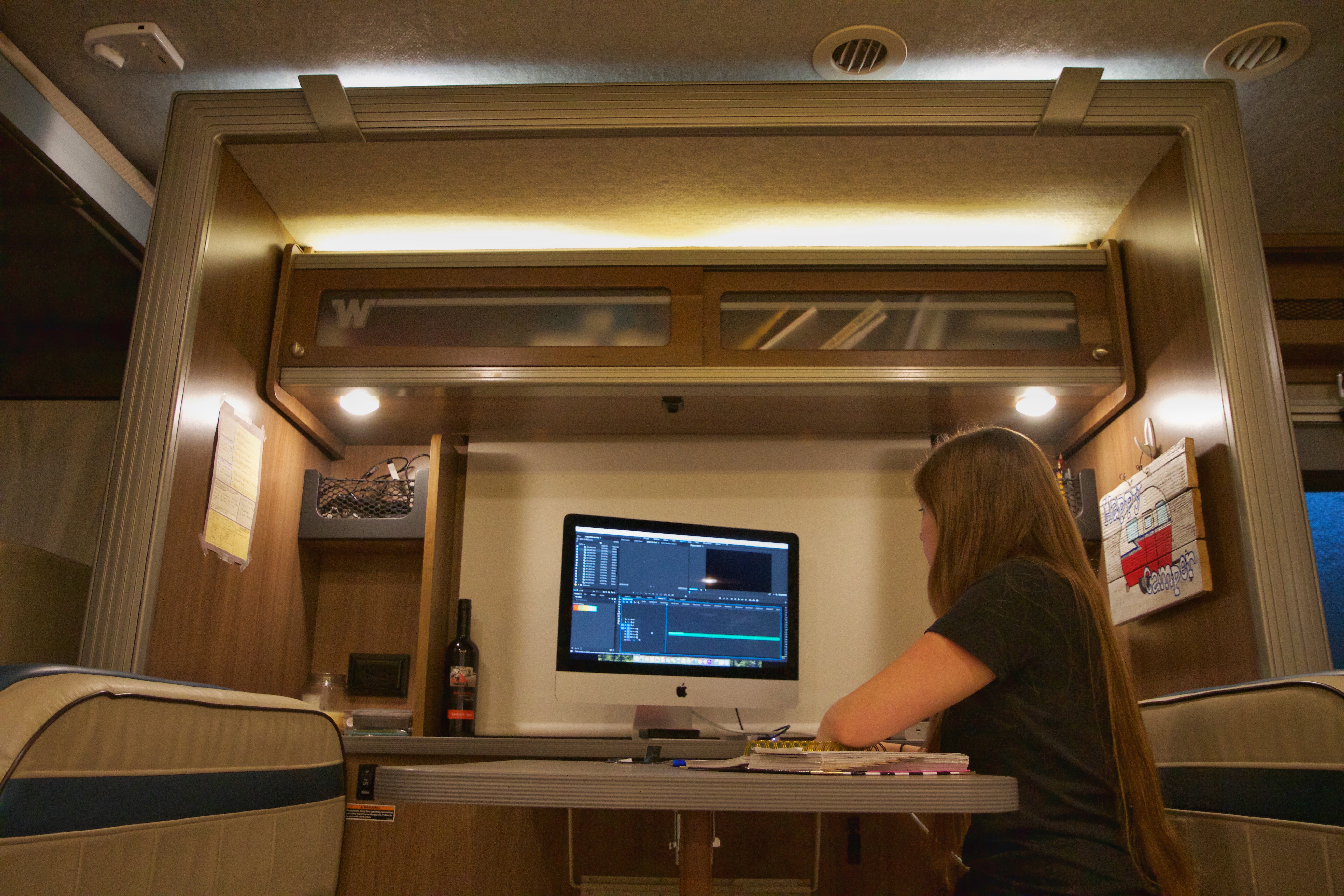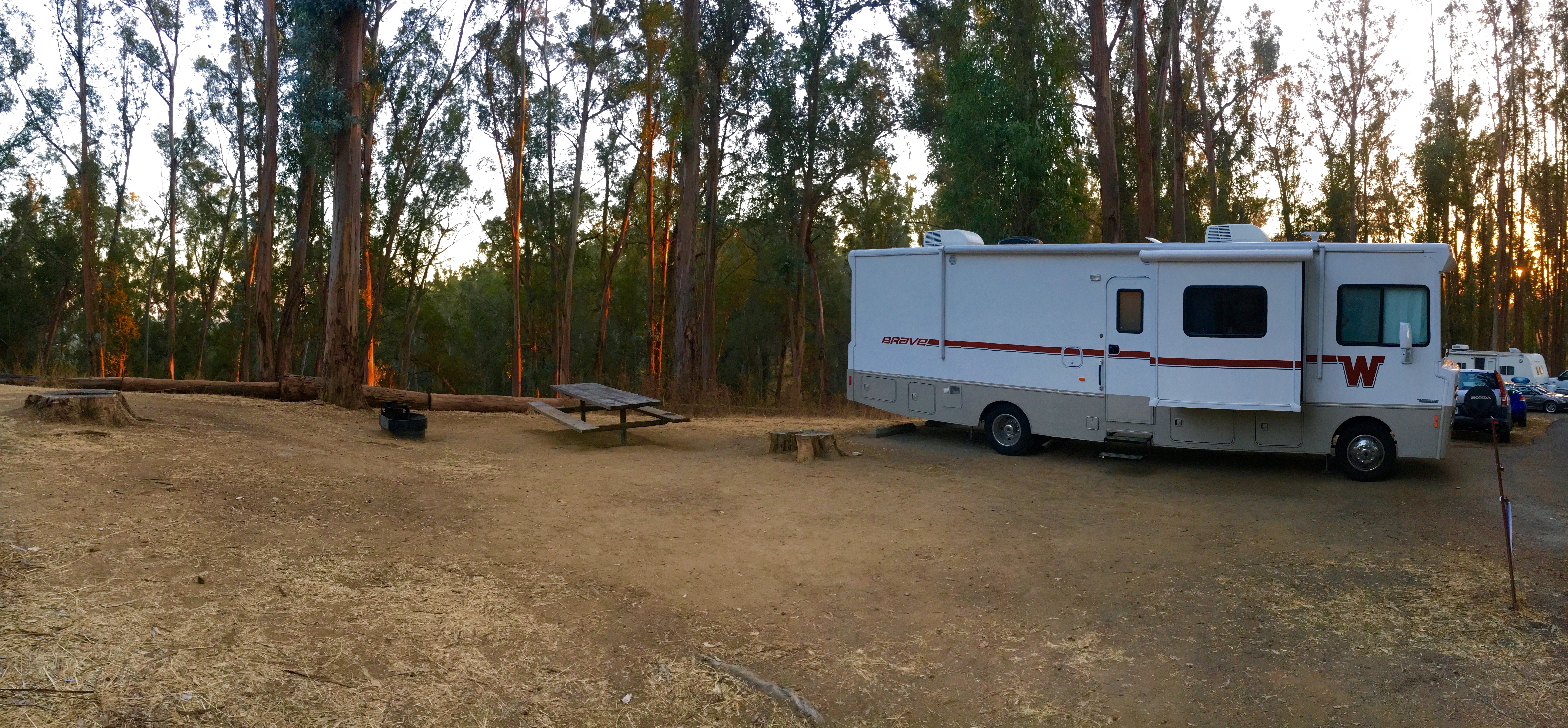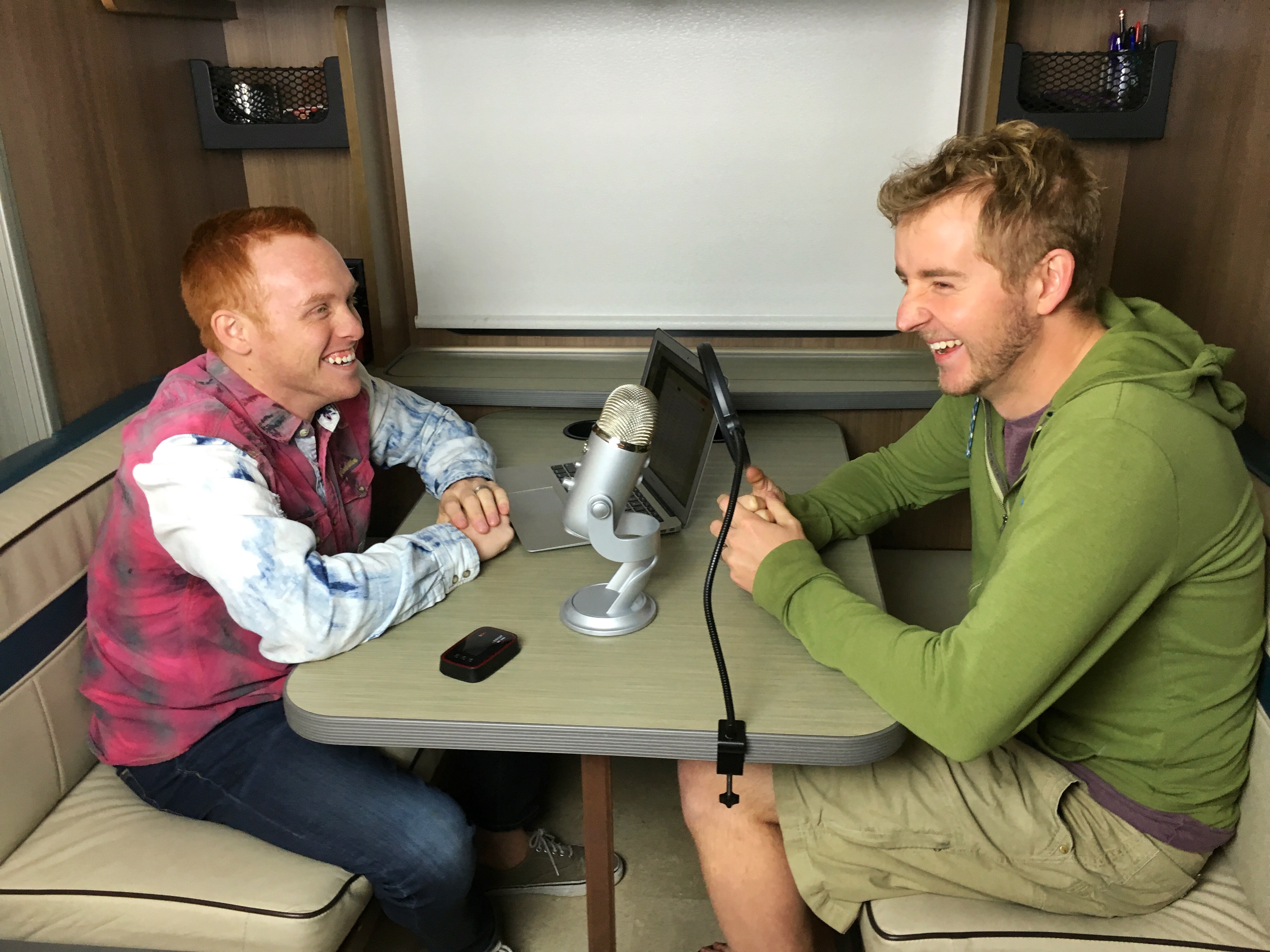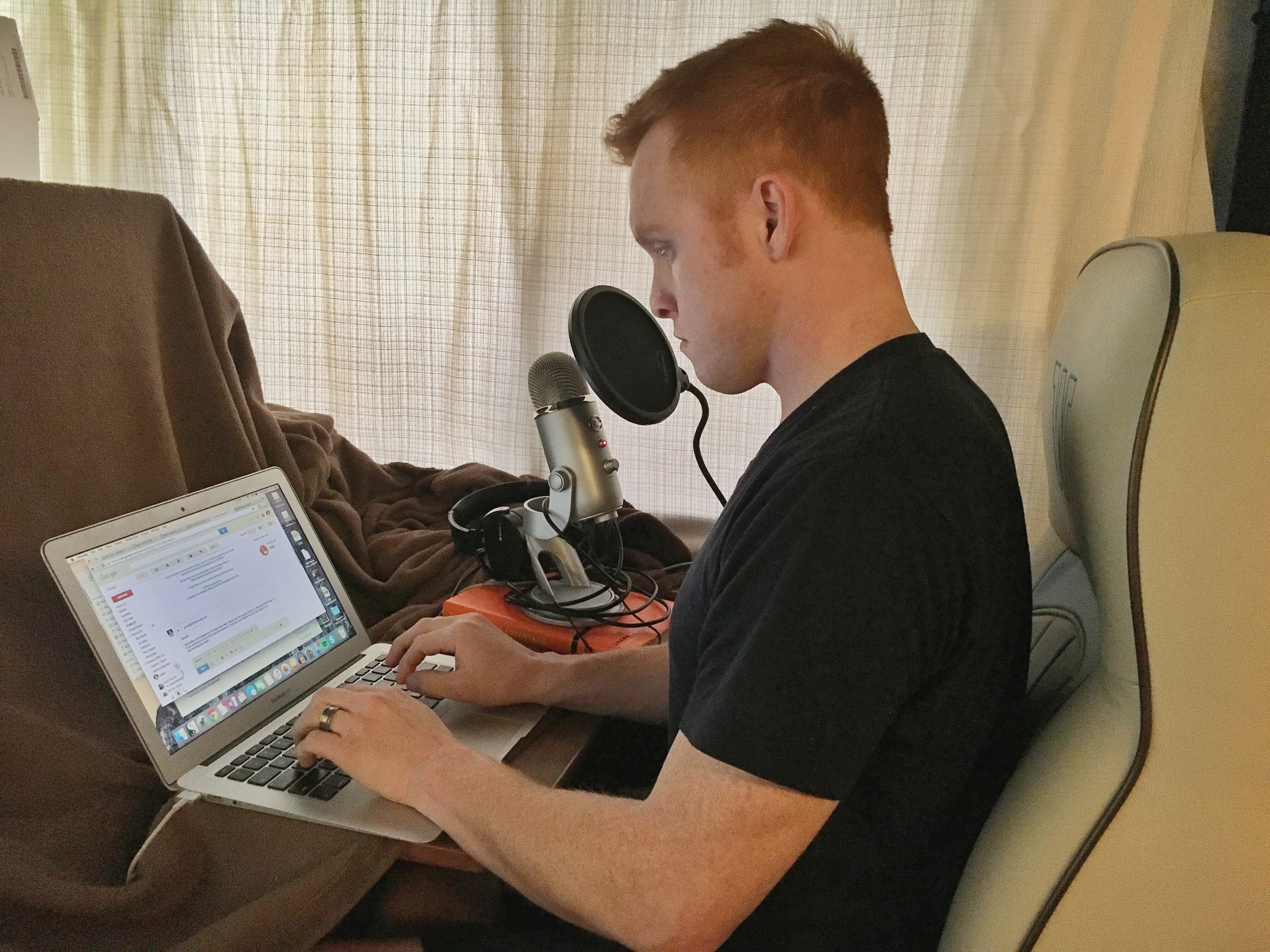
RV Entrepreneurs
"When I'm old and dying, I plan to look back on my life and say 'wow, that was an adventure,' not 'wow, I sure felt safe.'Tom Preston-Werner, Github co-founder
Alyssa and I run our own business. It feels weird saying that, because we didn't start it up like most people start a business. We didn't come up with the name of a business, hire a designer for a logo, build a business website, and do all of those standard things you do when first getting started. Instead, we decided that we wanted to travel full-time in an RV and we would need to build up a business around that lifestyle.

Is this the best way to start a business? Eh, probably not. The added stress of travel and lack of support community on the road doesn't help the low conditions of success when it comes to starting any business. But, I would argue with unlimited access to knowledge and connectivity of the internet there has never been a better time to start a remote business.
Plus, nothing gets me more excited about the prospect of building a wildly successful company that I can run from our RV while exploring America.
Right now we're joining the part of our generation that's proving we don't have to be held to conventional methods when building a business. We can build lean, remote teams, spend less on marketing dollars, and in the end, crush our competition who is still stuck doing "business as usual".
The past two years have been a process of figuring out exactly what it looks like to do that. We've had to figure out how much it costs to travel full-time, how long we like to spend in different parts of the country, how can we best work together as a team, what kind of work/clients do we want to pursue, and last year even had to sacrifice a bit of our travel plans so we could hustle on paying off student debt.
At this point in time, our main business is helping clients create, film, and launch online courses. We've worked with clients all over the country and some outside of the country. We've started small, gotten referrals by doing great work and leveraging our film and marketing skills has enabled us to continue traveling full-time in our RV.
I wrote today's blog to outline how myself and other people earn an income while traveling full-time in their RV. Earlier this year I launched a podcast called The RV Entrepreneur and this post outlines 10 different ways full-time RVers have built a remote income through their own business.
1. Video production
I have to start with this business because this is what Alyssa and I do from the road. For the past two years we've worked with clients all over the country producing videos for them. Our niche is producing videos for people who are creating online courses, although we've also made a documentary, promo videos, speaking reels, about videos and shot for TedX and other large conferences.
 The ultimate home office and studio.
The ultimate home office and studio.
Why this business makes sense:
We travel with our film equipment and can drive our RV to wherever our clients are going to be. For the past year, much of our travel has been structured around working with clients in different parts of the country and visiting cool places along the way.
Barriers to entry:
- Learning basic video production skills
- Buying basic camera package to get started
Learning curve before you can monetize this skill:
It took us 9 months, from first picking up a camera to getting our first paid client. That was filming 3-4 days per week, volunteering our services for free at events to network, reading articles and how-to videos, and messing up a lot.
Resources and places to learn:
- WesWages.com (This guy taught us more than anyone else about producing quality video)
- DIYVideoGuy
- Lynda.com -- Courses on: Final Cut X, Adobe Premiere, Lightroom, and others.
- Vimeo's Video School
- Wistia's learning center
2. Software/App Development
This is one of the more difficult arenas to jump into if you're not already tech savvy, but a popular option nonetheless. I've interviewed several people who have started some kind of software or app business that they can run from the road.
Why this business makes sense:
Software and app businesses are probably the most ideal remote based business. It requires a nominal hardware investment in computer gear and software, and you are free to devote yourself to enjoying your travels, creating new products, or improving the one you've already built.
Barriers to entry:
- A lot of time and dedication to learn programming and development skills.
Free resources to learn development:
Real-life example:
 Heath and Kevin record a podcast interview.
Heath and Kevin record a podcast interview.
Kevin Holesh was doing freelance web and app development for years until he built his first successful iPhone app called Moment (It's free and tracks how often you use your phone). Kevin's app has been downloaded over 2.5 million times, been featured all over national media, and supports him and his wife Mandy to travel full-time in their 5th wheel RV. Listen to his his full story on episode 10 of the RVE podcast.
How Kevin spends most of his time now (when not traveling):
Kevin divides his time between supporting current users of his app and working on new iterations and ways to improve the Moment app.
3. Etsy Shop
Running a physical product business from the road is not something I would have typically put on this list. But recently, I interviewed a couple who run their Etsy shop right out of their Casita trailer. They have a bin of around 2,000 paper products that's easily transportable and lightweight. They find new products in small towns across the country (their Etsy shop is vintage goods) and are able to make post office runs while traveling full-time.
Benefit to starting an Etsy Shop vs. Software development (or something more technical):
The learning curve is much lower for starting an Etsy store vs. learning how to code and develop an app. However, the competition is almost the same. For every Etsy shop that succeeds, thousands barely make any money. According to statistics found on this Etsy forum, there are around half a million Etsy stores out there.
Skills you'd need to learn:
- How to find your own unique niche in Etsy.
- How to take good product photos.
- How to properly price your products.
- Various other skills like customer service, how to create an intriguing brand, and managing profit margins.
4. Adventure (or Regular) Photography
The Holcombe family works with companies like GoPro, Jackson Kayaks, and here with the GoLife brand, and they do it all from their Winnebago View RV. They started as a local photography studio in Boulder, CO and then transferred their life to living on the road two years ago.
Why did they take their business on the road?
When they owned a local photography studio they were always flying their wedding and portrait clients out to beautiful, national parks. They decided that instead of simply flying out to national parks, they would try to spend all of their time traveling to parks and just have their clients meet them there. So far, it's worked out extremely well and their business has actually grown once they got on the road.
Why this business makes sense?
If you want your niche to be in adventure related photography, it makes a lot of sense for you to take your business on the road. We've even met wedding photographers who have hit the road full-time. They roll into wedding venues in their RV, unpack their gear, shoot the wedding and then find a campsite for the night.
A few great resources for learning photography:
5. Virtual Assistant
Since we took to the road over two years ago, we've met several people who worked from their RV's as virtual assistants. Being a virtual assistant could mean a number of different things. To sum up this kind of work, you execute any tasks for select clients that can be outsourced. Emails, blog writing copy, social media, invoices, and the list goes on and on.
Why this business makes sense?
Virtual assistants literally have the word virtual in the title, which gives VA's the opportunity to move around freely while traveling. Depending on your type of client, you may have to be a little more accessible within business hours, but that's up to the way you structure your business. Once you succeed at building up your own clientele for your VA business, you could even hire additional VA's to cover new clients and remove yourself from some of the day to day work.
Real-Life Example:
On episode #8 of the RVE podcast I interviewed a woman named Bryanna who has built up her own successful VA business while traveling the country with her husband and their four kids. This is a business she actually started while they were already traveling full-time. As with any business, getting your initial clients is going to be some of the most difficult work.
Tips for starting your own VA business:
- Invest a small amount of money in learning from someone who has already done it, like Virtual Miss Friday's course on starting a VA business.
- Write down what areas you can provide value for a potential client. Are you a good writer? Are you good with administrative tasks like email or invoicing? Do you like spreadsheets? Do you love research and doing lead generation? All of these are great skills that many business owners or executives would love to have in a virtual assistant. Make sure to keep a record of these skills so you know what your pitch can be when finding new clients.
- For your first client, pitch them on a free 30 day trial of your skills. You need to learn how to actually do the job of being a VA, plus you need referrals or testimonials from previous clients. Be upfront with a perspective client that you're still learning and that you want to prove yourself over a free 30 day period. If all works well, they can continue your services on a paid monthly basis.
- Do a good enough job they tell their other business owner friends about you so that you can get referrals instead of having to outreach and do sales, it's always easier this way.
6. Building profitable blog, YouTube Channel, or podcast
 What's with the blanket on the table? It absorbs background noise and makes the podcast recording sound better.
What's with the blanket on the table? It absorbs background noise and makes the podcast recording sound better.
I think one of the biggest misconceptions among people who choose full-time RVing is that they'll be able to successfully monetize their blog or content channel of choice. This is something quite a few people have done, but it's also something that takes a considerable amount of time and hard work.
On episode 27 of my podcast I talked with John and Peter from The RV Geeks who have built a massively large audience on YouTube with over 18,000,000 views and 70,000 subscribers. They provide DIY tips for RVers and make a significant amount of income from their following. They shared with me how they didn't intentionally build a large audience, but instead, just tried to create helpful videos.
Benefits to building profitable blog, podcast, or youtube channel:
- It's front-loaded work, or what some people call "passive income". This means you do a ton of work upfront and then create streams of income that work for you while you don't have to be literally working.
- It's a great tool for connecting with people or building community while you're on the road.
- It builds up your writing and communication skills.
Barriers for getting started:
- Learn how to build a basic blogging site (for free or paid). Here's a quick tutorial on how to set on up.
- Honing your craft of writing or making videos.
- Picking a subject matter that can be monetized overtime through ad revenue, ebooks, courses, sponsors or affiliate income.
- Building a ton of trust with your followers.
A few resources on building profitable blogs, Youtube Channels, and podcasts:
- How Michelle makes $25k/month blogging
- How to Choose a profitable Niche CopyBlogger
- 4 Incredible Tips on How to Build a Profitable Blog That Makes Money
A few different ways to make money from a blog, podcast, or Youtube Channel:
- Ebooks
- Online courses
- Ads
- Sponsorships (or sponsored content)
- Affiliate marketing
7. CPA
This is not really a business you would imagine doing remotely. Adam Nubern is a full-time, nomadic CPA that works with clients while him and his wife travel in their Casita trailer.
Resources:
- Here's an article on how to become a CPA.
- Conversation on Quora about becoming a remote CPA.
8. Content Strategist
A content strategist is like a social media marketing person or blogger on steroids.
For example, if you run social media for a company then you post on their social channels and develop strategy for specifically social media.
If you are a guest writer for a company you get paid to post blog copy that is relevant to that business.
If you are a content strategist for a company then you are creating the overall strategy for how the blog, social media, email marketing, and website all come together to help grow the business in real ways. You are the person who finds great content writers (or writes the blog yourself).
Payment comparison:
- Guest blogs can pay anywhere between: $25 - $1,000/post ($500 is the higher end)
- Social media: $250 - $2,000/month for clients
- Content management: $500-$5,000+/month
Resources to learn more and help you get started:
- 5 Ways to Break Into Content Strategy
- Quora thread on how to become a content strategist
- My interview with Mark Cuda on how he got started as a content strategist
Real-life example:
Mark Cuda is a 23 year old full-time RVer who I interviewed on my podcast. Mark has worked in design, but most recently transitioned into the role of content management for his clients. Listen here to the interview I did with him about how he finds new clients for his business while traveling.
9. WordPress Support
Over 75 million websites are powered by WordPress. Of those 75 million, many need assistance in keeping their WordPress site running smoothly and efficiently.
Jill is a solo female RVer who started a service-based business where she provides WordPress support packages for businesses who need help managing their site. Listen to her interview on the RV Entrepreneur podcast.
Here is a well researched article on how to become a top WordPress developer.
10. Voiceover Talent
Carrie Olsen is a voiceover actress who traveled around America last year in an RV with her husband Derek, promoting their book "One Bed, One Bank Account".
Carrie has recorded commercial projects for REI, AT&T, and many others. During a conversation I had with her last year, she credits her coach Alyson Steel for helping her get her start.
How much does it pay?
VO Talent can pay anywhere from $20 to several hundred dollars for an hour of work (source).
This list continues to grow the more time Alyssa and I spend on the road. Every week we meet another person who has started some kind of business they are running from their RV.
I'm a big believer that one of the best parts of running a remote business is the quality of life. Alyssa and I have made this intentional decision to build a business around our life, traveling and working together as a team. Could we make more money by starting a business in one central location? Possibly, but that doesn't excite me. I want to travel, see the world, and build a successful company.
Comments
Comments on this post are moderated, so they will not appear instantly. All relevant questions and helpful notes are welcome! If you have a service inquiry or question related to your RV, please reach out to the customer care team directly using the phone numbers or contact form on this page .